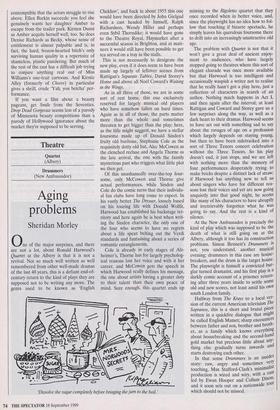Theatre
Quartet (Albery) Drummers
(New Ambassador)
Aging problems
Sheridan Morley
One of the major surprises, and there are not a lot, about Ronald Harwood's Quartet at the Albery is that it is not a revival. Not so much well written as well remembered from other well-made dramas of the last 40 years, this is a defiant end-of- century return to the kind of plays they are supposed not to be writing any more. The genre used to be known as 'English Chekhov', and back in about 1955 this one would have been directed by John Gielgud with a cast headed by himself, Ralph Richardson, Wendy Hiller and perhaps even Sybil Thorndike; it would have gone to the Theatre Royal, Haymarket after a successful season in Brighton, and at mati- nees it would still have been possible to get tea served on a tray in the stalls.
This is not necessarily to denigrate the new play, even if it does seem to have been made up largely of leftover scenes from Rattigan's Separate Tables, David Storey's Home and above all Noel Coward's Waiting in the Wings.
As in all three of those, we are in some sort of rest home, this one exclusively reserved for largely musical old players who have somehow fallen on hard times. Again as in all of those, the parts matter more than the whole and sometimes threaten to get bigger than the play; here, as the title might suggest, we have a stellar foursome made up of Donald Sinden's fruity old baritone, Stephanie Cole as the requisitely dotty old bat, Alec McCowen as the clenched recluse and Angela Thorne as the late arrival, the one with the faintly mysterious past who triggers what little plot we then get.
Of this unashamedly over-the-top four- some, only McCowen and Thorne give actual performances, while Sinden and Cole do the comic turns that their individu- al fan clubs have long come to expect. In his vastly better The Dresser, loosely based on his touring life with Donald Wolfit, Harwood has established his backstage ter- ritory and here again he is best when writ- ing the Sinden character, the only one of the four who seems to have no regrets about a life spent belting out the Verdi standards and fantasising about a series of romantic entanglements.
Cole is already in early stages of Alz- heimer's, Thorne has for largely psycholog- ical reasons lost her voice and with it her career, and McCowen gets the speech in which Harwood really defines his message, the one about artists having a greater duty to their talent than their own peace of mind. Sure enough, this quartet ends up Dissolve the sugar completely before bringing the jam to the boil.' miming to the Rigaletto quartet that they once recorded when in better voice, and, since the playwright has no idea how to fol- low that touching if bizarre spectacle, he simply leaves his querulous foursome there to drift into an increasingly unattractive old age.
The problem with Quartet is not that it won't give a great deal of ancient enjoy- ment to audiences, who have largely stopped going to theatres where this sort of elegant charade was once more available but that Harwood is too intelligent and occasionally waspish a writer not to realise that he really hasn't got a play here, just a collection of characters in search of an author. Nothing much happens in Act I, and then again after the interval; at least Rattigan and Coward and Storey gave us a few surprises along the way, as well as a dark heart to their dramas. Harwood seems to have set out with something sad to say about the ravages of age on a profession which largely depends on staying young, but then to have been sidetracked into a sort of Three Tenors concert celebration without the Three Tenors. So his play doesn't end, it just stops, and we are left with nothing more than the memory of four performances desperately trying to make bricks despite a distinct lack of straw; if Harwood has anything new to tell us about singers who have for different rea- sons lost their voices and yet are now going unquietly into that good night, he seems like many of his characters to have abruptly and irretrievably forgotten what he was going to say. And the rest is a kind of silence.
At the New Ambassador is precisely the kind of play which was supposed to be the death of what is still going on at the Albery, although it too has its construction problems. Simon Bennett's Drummers 15 not, you understand, another musical evening; drummers in this case are house- breakers, and the drum is the target house. The playwright is himself a convicted bur- glar turned dramatist, and his first play is a darkly comic account of a prisoner return- ing after three years inside to settle some old and new scores, not least amid his own south London family.
Halfway from The Krays to a local ver- sion of the current American television The Sopranos, this is a short and brutal piece written in a quickfire dialogue that might be called English Mamet; sharp encounters between father and son, brother and broth- er, as a family which knows everything about housebreaking and the second-hand gold market but precious little about any- thing else gradually turns inwards and starts destroying each other. In that sense Drummers is an insider story: raw, angry and sometimes very touching, Max Stafford-Clark's minimalist production is wired and wiry, with a cast led by Ewan Hooper and Callum Dixon, and it soon sets out on a nationwide tour which should not be missed.


























































































 Previous page
Previous page